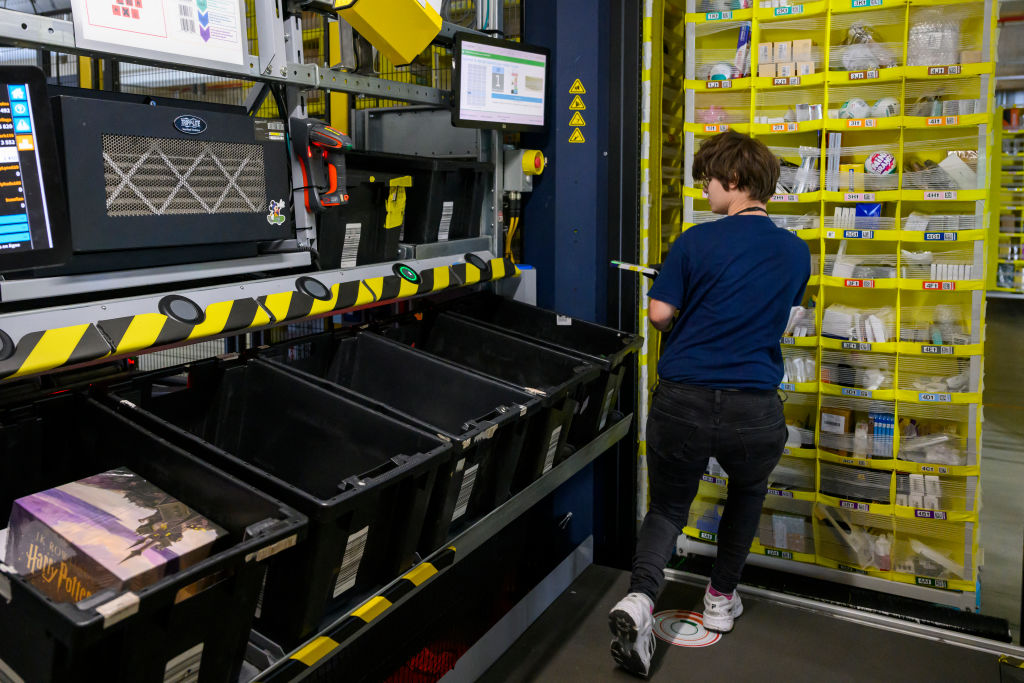In a critical move just ahead of the peak holiday season, thousands of Amazon workers will walk off the job on Thursday, challenging the e-commerce giant in the final days of its busiest time of year.
The Teamsters union will launch the “largest strike against Amazon in U.S. history” beginning at 6 a.m. EST on December 19. The nationwide action follows Amazon’s repeated refusal to follow the law and bargain with the thousands of Amazon workers who are part of the Teamsters, according to a release from International Brotherhood of Teamsters.
“If your package is delayed during the holidays, you can blame Amazon’s insatiable greed. We gave Amazon a clear deadline to come to the table and do right by our members. They ignored it,” said Teamsters General President Sean M. O’Brien said in a statement.
“These greedy executives had every chance to show decency and respect for the people who make their obscene profits possible. Instead, they’ve pushed workers to the limit and now they’re paying the price. This strike is on them,” O’Brien added.
The walkout will involve workers from facilities in New York City, Skokie, Illinois, Atlanta, San Francisco, and Southern California. Amazon Teamsters at other facilities are prepared to join them.
Teamsters’ local unions are also putting up primary picket lines at hundreds of Amazon Fulfillment Centers nationwide. Amazon warehouse workers and drivers without collective bargaining agreements have the legal right to honor these picket lines by withholding their labor.
“What we’re doing is historic,” said Leah Pensler, a warehouse worker at DCK6 in San Francisco. “We are fighting against a vicious union-busting campaign, and we are going to win.”
The strike follows Amazon’s failure to meet a Dec. 15 deadline to negotiate contracts that would secure better wages and working conditions, prompting union leaders to threaten “large-scale labor actions at a critical time of year,” reported Reuters.
The International Brotherhood of Teamsters represents about 10,000 workers at 10 U.S. Amazon facilities, and union officials confirmed that employees at seven of these sites will walk out. It includes workers at the Staten Island warehouse, who could join the strike at any time.
Strikes have been authorized at the DIL7 delivery station in Skokie, Illinois, and at the JFK8 and DBK4 locations in New York City.
While unionized workers make up only 1% of Amazon’s hourly workforce, the walkout is expected to disrupt operations as the company scrambles to fulfill orders during its busiest season.
In New York City alone, Amazon operates multiple warehouses and delivery depots. So, the strike is likely to create a ripple effect that could disrupt deliveries in one of its largest markets.
Stressing on the strike’s potential impact, Tobias Cheng, a worker at Amazon’s KSBD air hub in San Bernardino, said: “We know how important our air hub is to Amazon’s operations. If Amazon forces a strike, it might have a serious impact on customers throughout the region and beyond.”
The standoff highlights Amazon’s ongoing resistance to union efforts. Despite a landmark victory for workers in Staten Island in 2022, the company continues to refuse to recognize the union.
Benjamin Sachs, a professor of labor and industry at Harvard Law School, described Amazon’s approach as “ignoring their workers’ rights to collectively organize and negotiate.”
“Amazon clearly has developed a strategy of ignoring their workers’ rights to collectively organize and negotiate,” he noted.
Amazon, on its part, claims that it prefers direct relationships with its workers, consistently opposing unionization. The company disputes the Teamsters’ representation of its employees, even though workers at several facilities have signed union cards.
“For more than a year now, the Teamsters have continued to intentionally mislead the public – claiming that they represent ‘thousands of Amazon employees and drivers’,” Eileen Hands, a company spokesperson said. “They don’t, and this is another attempt to push a false narrative.”
To counter rising labor dissatisfaction, Amazon has invested heavily in wage increases. Earlier this year, the retailer announced a $2.1 billion initiative to raise pay for its fulfillment and transportation employees, increasing base wages by at least $1.50 per hour to around $22, which amounts to nearly 7% increase.
However, Amazon’s labor issues are far from over. The company is likely to face more union actions in the coming months, including election at the Philadelphia Whole Foods, which would be the first since Amazon acquired the grocery chain in 2017. Additionally, last month an administrative judge ordered a third union election at an Alabama warehouse, after ruling that Amazon had unlawfully interfered with previous unionization efforts.







